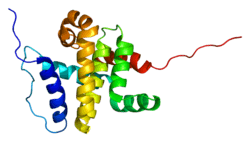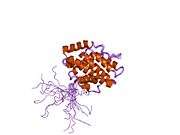BCL2L2
Bcl-2-like protein 2 is a protein that in humans is encoded by the BCL2L2 gene.[1][2] It was originally discovered by Leonie Gibson, Suzanne Cory and colleagues at the Walter and Eliza Hall Institute of Medical Research, who called it Bcl-w.[3]
Function
This gene encodes a pro-survival (anti-apoptotic) member of the bcl-2 protein family. The proteins of this family form hetero- or homodimers and act as anti- and pro-apoptotic regulators. Expression of this gene in cells has been shown to contribute to reduced cell apoptosis under cytotoxic conditions. Studies of the related gene in mice indicated a role in the survival of NGF- and BDNF-dependent neurons. Mutation and knockout studies of the mouse gene demonstrated an essential role in adult spermatogenesis.[2]
Relative to its Bcl-2 counterparts there is considerably less data on this particular protein. Located on chromosome 14q11 it appears to be redundant in most tissues apart from specific examples.
Interactions
BCL2L2 has been shown to interact with:
References
- ↑ Gibson L, Holmgreen SP, Huang DC, Bernard O, Copeland NG, Jenkins NA, Sutherland GR, Baker E, Adams JM, Cory S (October 1996). "bcl-w, a novel member of the bcl-2 family, promotes cell survival". Oncogene 13 (4): 665–75. PMID 8761287.
- 1 2 "Entrez Gene: BCL2L2 BCL2-like 2".
- ↑ Gibson L, Holmgreen SP, Huang DC; et al. (1996). "bcl-w, a novel member of the bcl-2 family, promotes cell survival.". Oncogene 13 (4): 665–75. PMID 8761287.
- ↑ Hsu SY, Lin P, Hsueh AJ (September 1998). "BOD (Bcl-2-related ovarian death gene) is an ovarian BH3 domain-containing proapoptotic Bcl-2 protein capable of dimerization with diverse antiapoptotic Bcl-2 members". Mol. Endocrinol. 12 (9): 1432–40. doi:10.1210/mend.12.9.0166. PMID 9731710.
- ↑ O'Connor L, Strasser A, O'Reilly LA, Hausmann G, Adams JM, Cory S, Huang DC (January 1998). "Bim: a novel member of the Bcl-2 family that promotes apoptosis". EMBO J. 17 (2): 384–95. doi:10.1093/emboj/17.2.384. PMC 1170389. PMID 9430630.
- 1 2 Ayllón V, Cayla X, García A, Fleischer A, Rebollo A (July 2002). "The anti-apoptotic molecules Bcl-xL and Bcl-w target protein phosphatase 1alpha to Bad". Eur. J. Immunol. 32 (7): 1847–55. doi:10.1002/1521-4141(200207)32:7<1847::AID-IMMU1847>3.0.CO;2-7. PMID 12115603.
- ↑ Chen L, Willis SN, Wei A, Smith BJ, Fletcher JI, Hinds MG, Colman PM, Day CL, Adams JM, Huang DC (February 2005). "Differential targeting of prosurvival Bcl-2 proteins by their BH3-only ligands allows complementary apoptotic function". Mol. Cell 17 (3): 393–403. doi:10.1016/j.molcel.2004.12.030. PMID 15694340.
- ↑ Bae J, Hsu SY, Leo CP, Zell K, Hsueh AJ (October 2001). "Underphosphorylated BAD interacts with diverse antiapoptotic Bcl-2 family proteins to regulate apoptosis". Apoptosis 6 (5): 319–30. doi:10.1023/A:1011319901057. PMID 11483855.
- ↑ Holmgreen SP, Huang DC, Adams JM, Cory S (June 1999). "Survival activity of Bcl-2 homologs Bcl-w and A1 only partially correlates with their ability to bind pro-apoptotic family members". Cell Death Differ. 6 (6): 525–32. doi:10.1038/sj.cdd.4400519. PMID 10381646.
Further reading
- Nagase T, Seki N, Ishikawa K; et al. (1997). "Prediction of the coding sequences of unidentified human genes. VI. The coding sequences of 80 new genes (KIAA0201-KIAA0280) deduced by analysis of cDNA clones from cell line KG-1 and brain.". DNA Res. 3 (5): 321–9, 341–54. doi:10.1093/dnares/3.5.321. PMID 9039502.
- O'Connor L, Strasser A, O'Reilly LA; et al. (1998). "Bim: a novel member of the Bcl-2 family that promotes apoptosis.". EMBO J. 17 (2): 384–95. doi:10.1093/emboj/17.2.384. PMC 1170389. PMID 9430630.
- Ross AJ, Waymire KG, Moss JE; et al. (1998). "Testicular degeneration in Bclw-deficient mice.". Nat. Genet. 18 (3): 251–6. doi:10.1038/ng0398-251. PMID 9500547.
- Hsu SY, Lin P, Hsueh AJ (1998). "BOD (Bcl-2-related ovarian death gene) is an ovarian BH3 domain-containing proapoptotic Bcl-2 protein capable of dimerization with diverse antiapoptotic Bcl-2 members.". Mol. Endocrinol. 12 (9): 1432–40. doi:10.1210/mend.12.9.0166. PMID 9731710.
- Middleton G, Wyatt S, Ninkina N, Davies AM (2001). "Reciprocal developmental changes in the roles of Bcl-w and Bcl-x(L) in regulating sensory neuron survival.". Development 128 (3): 447–57. PMID 11152643.
- O'Reilly LA, Print C, Hausmann G; et al. (2001). "Tissue expression and subcellular localization of the pro-survival molecule Bcl-w.". Cell Death Differ. 8 (5): 486–94. doi:10.1038/sj/cdd/4400835. PMID 11423909.
- Bae J, Hsu SY, Leo CP; et al. (2001). "Underphosphorylated BAD interacts with diverse antiapoptotic Bcl-2 family proteins to regulate apoptosis.". Apoptosis 6 (5): 319–30. doi:10.1023/A:1011319901057. PMID 11483855.
- Puthalakath H, Villunger A, O'Reilly LA; et al. (2001). "Bmf: a proapoptotic BH3-only protein regulated by interaction with the myosin V actin motor complex, activated by anoikis.". Science 293 (5536): 1829–32. doi:10.1126/science.1062257. PMID 11546872.
- Ayllón V, Cayla X, García A; et al. (2002). "The anti-apoptotic molecules Bcl-xL and Bcl-w target protein phosphatase 1alpha to Bad.". Eur. J. Immunol. 32 (7): 1847–55. doi:10.1002/1521-4141(200207)32:7<1847::AID-IMMU1847>3.0.CO;2-7. PMID 12115603.
- Strausberg RL, Feingold EA, Grouse LH; et al. (2003). "Generation and initial analysis of more than 15,000 full-length human and mouse cDNA sequences.". Proc. Natl. Acad. Sci. U.S.A. 99 (26): 16899–903. doi:10.1073/pnas.242603899. PMC 139241. PMID 12477932.
- Denisov AY, Madiraju MS, Chen G; et al. (2003). "Solution structure of human BCL-w: modulation of ligand binding by the C-terminal helix.". J. Biol. Chem. 278 (23): 21124–8. doi:10.1074/jbc.M301798200. PMID 12651847.
- Hinds MG, Lackmann M, Skea GL; et al. (2003). "The structure of Bcl-w reveals a role for the C-terminal residues in modulating biological activity.". EMBO J. 22 (7): 1497–507. doi:10.1093/emboj/cdg144. PMC 152889. PMID 12660157.
- Wilson-Annan J, O'Reilly LA, Crawford SA; et al. (2003). "Proapoptotic BH3-only proteins trigger membrane integration of prosurvival Bcl-w and neutralize its activity.". J. Cell Biol. 162 (5): 877–87. doi:10.1083/jcb.200302144. PMC 2172834. PMID 12952938.
- Zhu X, Wang Y, Ogawa O; et al. (2004). "Neuroprotective properties of Bcl-w in Alzheimer disease.". J. Neurochem. 89 (5): 1233–40. doi:10.1111/j.1471-4159.2004.02416.x. PMID 15147516.
- Gerhard DS, Wagner L, Feingold EA; et al. (2004). "The status, quality, and expansion of the NIH full-length cDNA project: the Mammalian Gene Collection (MGC).". Genome Res. 14 (10B): 2121–7. doi:10.1101/gr.2596504. PMC 528928. PMID 15489334.
- Chen L, Willis SN, Wei A; et al. (2005). "Differential targeting of prosurvival Bcl-2 proteins by their BH3-only ligands allows complementary apoptotic function.". Mol. Cell 17 (3): 393–403. doi:10.1016/j.molcel.2004.12.030. PMID 15694340.
- Kimura K, Wakamatsu A, Suzuki Y; et al. (2006). "Diversification of transcriptional modulation: large-scale identification and characterization of putative alternative promoters of human genes.". Genome Res. 16 (1): 55–65. doi:10.1101/gr.4039406. PMC 1356129. PMID 16344560.
- Denisov AY, Chen G, Sprules T; et al. (2006). "Structural model of the BCL-w-BID peptide complex and its interactions with phospholipid micelles.". Biochemistry 45 (7): 2250–6. doi:10.1021/bi052332s. PMID 16475813.
- Certo M, Del Gaizo Moore V, Nishino M; et al. (2006). "Mitochondria primed by death signals determine cellular addiction to antiapoptotic BCL-2 family members.". Cancer Cell 9 (5): 351–65. doi:10.1016/j.ccr.2006.03.027. PMID 16697956.
| |||||||||||||




